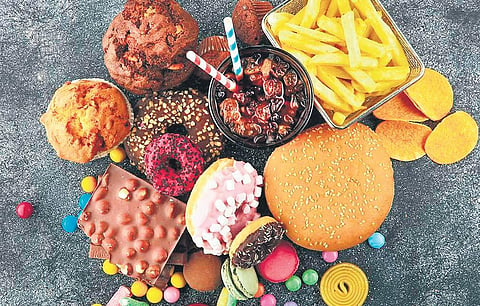

NEW DELHI: Exposure to high-in-fat, salt, and sugar (HFSS) food advertisements in India underscores the necessity for a robust regulatory framework to shield children from consumables portrayed as fun, relaxed, and exciting, according to a study in The Lancet.
The study emphasises the need to define ‘junk food’ as the marketing of HFSS foods negatively impacts consumption patterns, particularly among young children, leading to increased lifetime risks of weight gain, overweight, obesity, and non-communicable diseases.
Published in The Lancet Regional Health-Southeast Asia, the study notes a higher prominence of single TV households in India, with TV co-viewership predominantly occurring between 6 pm and 11 pm. “Restricting HFSS advertisements from being displayed during this period may lead to a reduction in exposure among children,” the study suggests.
In India, a dual burden exists with over nutrition — manifested as obesity or overweight — and undernutrition. Quoting the World Obesity Atlas 2023, which predicts an annual increase in the obesity rate among children to be 9.1 per cent between 2020 and 2035, the study says this could be attributed to complex interactions among societal, environmental, food industry and individual factors.
The daily average calorie consumption in India falls below the recommended 2503 kcal/capita/day across all groups, irrespective of income, regions, and sectors — both rural and urban — except for the wealthiest 5 per cent of the population.
“It is worth noting that an average Indian household derives more calories from processed foods than fruits, highlighting their significant contribution to total calorie intake. Due to the economic upsurge, the role of various foreign players in the food industry and aggressive marketing, Indians have been increasingly exposed to ultra-processed, high sugar, salt, and fat foods (HFSS),” the study reveals.
Authors from various institutions, highlight that policies restricting food marketing to children are the most cost-effective tools to protect children from harmful marketing encouraging unhealthy diets in the long term.
Upon reviewing regulations in India to protect children from harmful marketing of HFSS food, the authors found 13 policies — nine mandatory and four self-regulatory — that are relevant to advertising in the country.
However, the authors said, out of the nine mandatory policies, Guidelines for Prevention of Misleading Advertisements and Endorsements for Misleading Advertisements, 2022, is the only policy restricting HFSS food advertisements to children across all media.